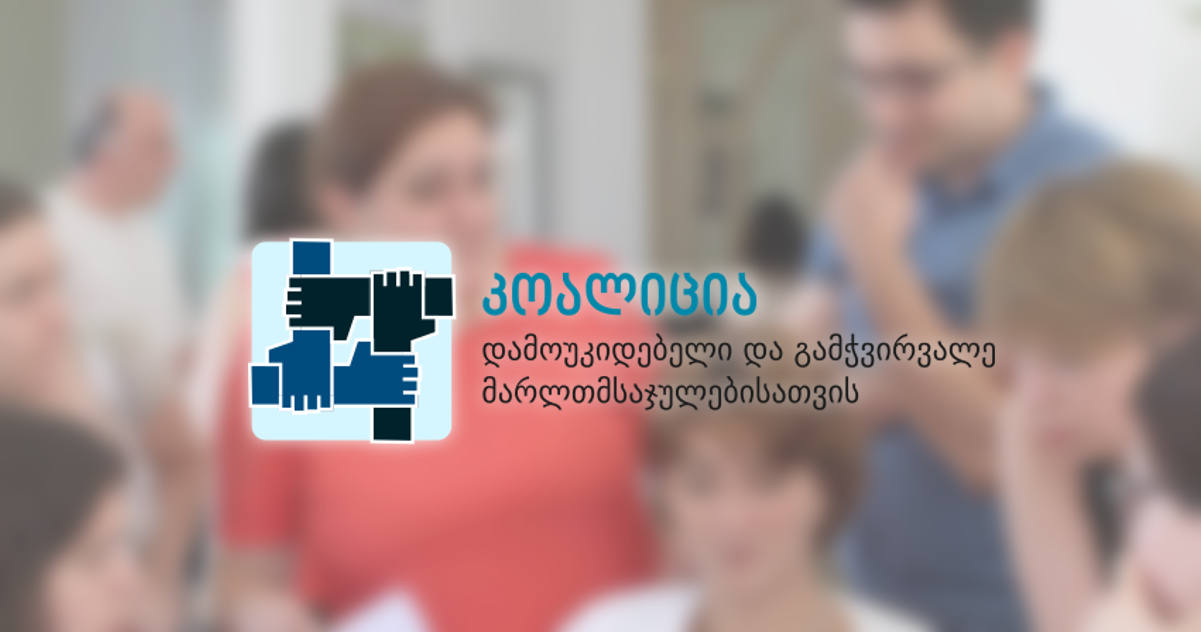


The Coalition for an Independent and Transparent Judiciary calls on the Government to change the composition rules (composition) and procedures of the Commission for the selection of the Strasbourg Court judicial candidates. If the majority of the Commission members continue to represent the government branches, representatives of independent institutions will stay in the minority and the Commission will continue to act according to the same procedures. Correspondingly, the involvement of the Commission in the selection process will not ensure the selection and submission of appropriate candidates to Strasbourg.
On July 25, it came to our attention that two out of three Strasbourg Court judicial candidates submitted by the Government of Georgia were declined. The Minister of Justice stated that a new national competition will be held to identify two additional candidates.
The public is aware that the Coalition for an Independent and Transparent Judiciary took part in the work of the Commission for the Selection of the European Court Judicial Candidates. From the very beginning it was clear to us that civil society’s involvement in the work of the Commission was nominal. Despite this, we decided to take part in the process because it was important to ensure its openness, transparency and objectivity.
During both the first and the second competitions, the Coalition expressed its opinions and underscored problems in the judicial selection competition. Through direct involvement in the commission’s work we discovered that the assessments made by representatives of different branches of government were governed not by the idea of determining whether candidates met the established qualification criteria, but to unconditionally support preliminarily selected candidates with an aim to include them in the list to be submitted to the Government. In its statements the Coalition also emphasized the flaws of the legislation governing the candidate selection competition as well as problems identified in practice. These comments and statements were shared with the relevant bodies of the Council of Europe.
Unfortunately, the Government of Georgia did not consider the comments and recommendations during either the first or second competitions. If considered, these recommendations would have prevented rejection of the lists of three candidates.
It is clear that for the second time the Commission failed to perform its primary task – to put together a list of judicial candidates for the European Court of Human Rights that would allow the Council of Europe to actually make a choice.
The Coalition believes that the only way out of this situation is to change the rule for the composition of the Commission (composition) and revisit its procedures. In light of the fact that the Commission with its current composition and procedures failed to perform its tasks two times, it is unrealistic that the same composition will carry out an objective competition in its third attempt.
The Government of Georgia decides on the final list of candidates to be submitted to Strasbourg. Correspondingly, it is appropriate for representatives of independent institutions instead of representatives of the Government branches to make up the majority (or full composition) of the Commission. It is also important to oblige the members of the Commission to justify the scores that they give. These scores have to be publicly available. Also, conflict of interest issues have to be regulated. If these suggestions are not considered we believe that the Coalition’s involvement in the Commission will be pointless. Hence, we will refuse to take part in the third competition.
We also stand ready to engage in the development of new composition rules and procedures for the Commission.
ჯ. კახიძის #15, თბილისი, საქართველო, 0102 ; ტელ: (995 32) 95 23 53; ფაქსი: (995 32) 92 32 11; ელ-ფოსტა: gyla@gyla.ge; www.gyla.ge
15, J. Kakhidze str. 0102, Tbilisi, Georgia. Tel: (995 32) 95 23 53; Fax: (995 32) 92 32 11; E-mail: gyla@gyla.ge; www.gyla.ge